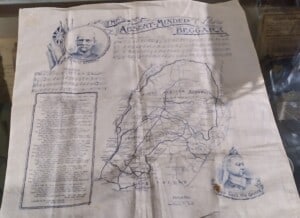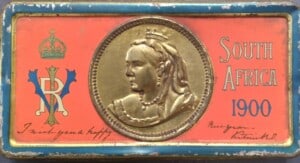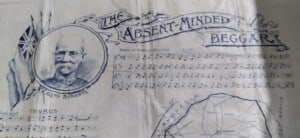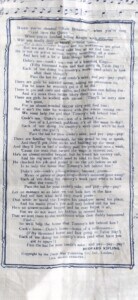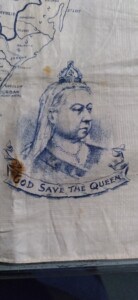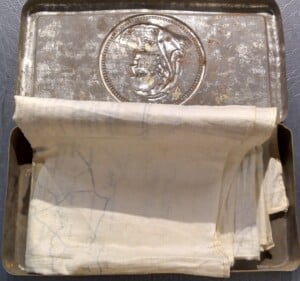Rectangular gold-painted tin box with hinge lid, with a red colour lid in a blue border, on the centre of the lid is embossed a portrait of Queen Victoria, to the left of the stamp is printed the royal cypher of Queen Victoria and to the right is printed “SOUTH AFRICA 1900”, and printed in small, black, cursive font across the bottom of the lid is: “I wish you a happy new year. Victoria R.I.”
Contained in the box is a cream-coloured linen cloth piece, likely either a handkerchief or scarf, embroidered lines near the edge forming a border frame, with prints on it featuring: a portrait in the top right of Lord Roberts (the commander of all British forces in the South Africa War from December 1899 to December 1900) in a circular border with flags of the British Empire, a portrait in the bottom right of Queen Victoria with the words in a banner under saying: “GOD SAVE THE QUEEN”, a detailed map of a region of Southern Africa focusing on the two Boer republics – Transvaal and Orange Free State – including roads and railroads and including parts of then Cape Colony/Natal/Rhodesia/Bechuanaland/Portuguese South Africa, and the music sheet and lyrics/poem of the song “The Absent-Minded Beggar”. The music sheet is composed by Sir Arthur Sullivan and the poem is written by Rudyard Kipling (author of The Jungle Book).
The cloth, either a handkerchief or scarf, was produced and sold by the Daily Mail as merchandise as part of a charity drive to support the families of the soldiers sent to the Boer War, as the initial forces, approximately 50 000 soldiers, that were raised in the United Kingdom to be sent to South Africa were conscripted reservists and were done so with reduced pay and no benefits. The charity was very successful, raising about £250 000, which is over $50 000 000 CAD in 2023. The combination of Arthur Sullivan’s music, one of the finest English musicians at the time, with Rudyard Kipling’s poem, the author of The Jungle Book and was also one of the finest English authors at the time, became widely popular and successful becoming a staple song sung across the country, as written by The Daily Chronicle at the time: “It has not been often that the greatest of English writers and the greatest of English musicians have joined inspiring words and stirring melody in a song which expresses the heart feelings of the entire nation”. The featuring of Lord Roberts’ image was also a symbol of change for the war as he was appointed to lead the war in December 1899, as a replacement of Sir Redvers Henry Buller, after a number of defeats suffered by the British forces at the start of the war, and he would eventually lead the British to victory.

